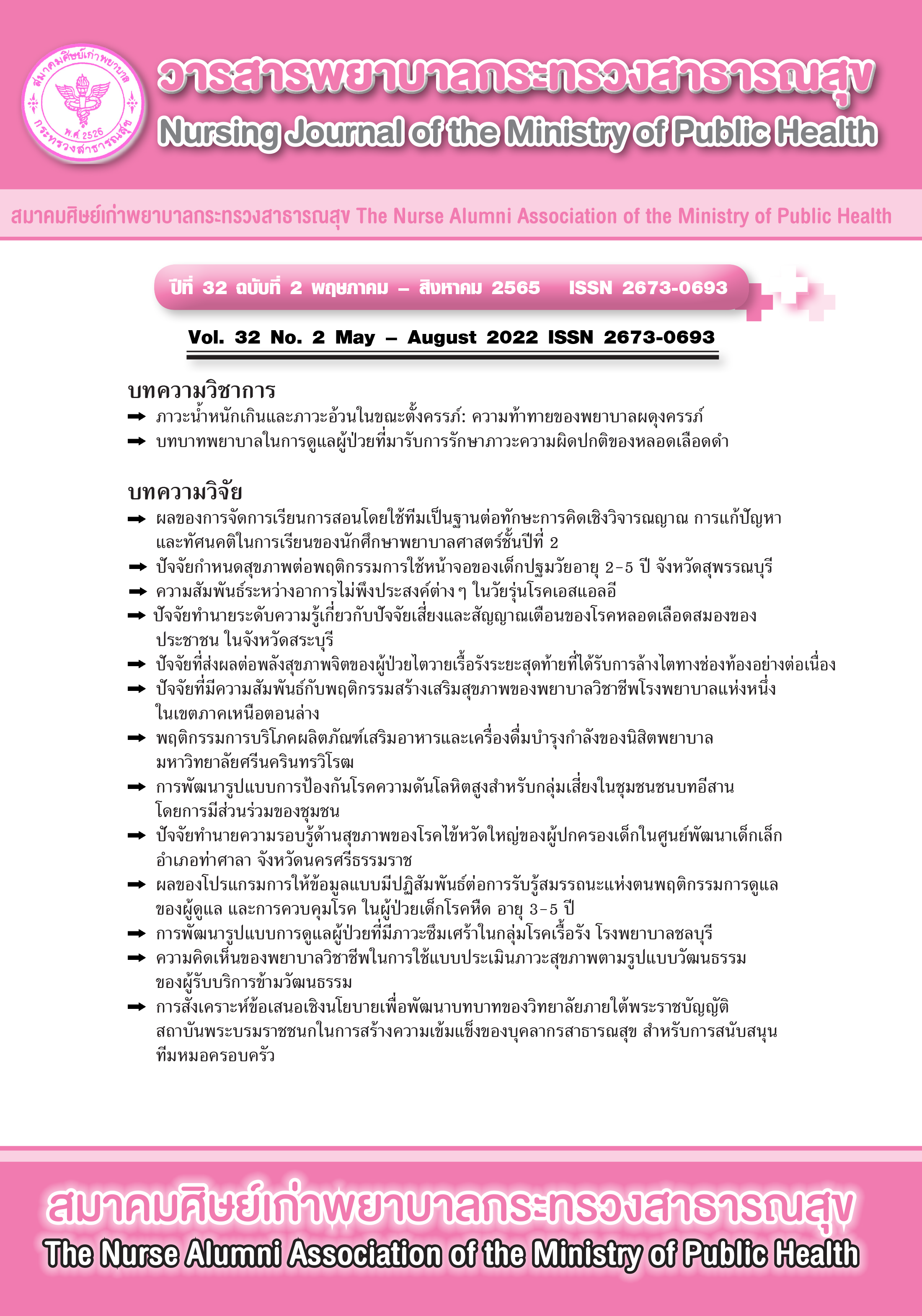Nurses’ Opinions on the Use of Health Status Assessment based on a Cultural Model for Transcultural Clients
Main Article Content
Abstract
This research aimed to study nurses’ opinions on use of health status assessment based on a cultural model for transcultural clients. The sample consisted of 40 voluntarily selected registered nurses with more than three years working experience caring for clients from various nationalities in the inpatient department of Bhudasothon hospital. The researcher collected data on the use of the health assessment form using an opinion questionnaire from these nurses and summarized their opinions. The data were analyzed using the median and interquartile range with the median being at least 3.50 and the interquartile range being less than 1.50. These are acceptable criteria for registered nurses to establish a consistent opinion. The results showed that the opinions of professional nurses on the health status assessment based on a cultural model for transcultural clients in terms of importance and suitability were at the highest level. Four main topics and 19 sub-topics were arranged from greatest to least median, as follows: 1) healthcare according to the lifestyle of the service recipients (Mdn =4.81, IQR =.00), 2) lifestyle behavior of the service recipients (Mdn = 4.78, IQR =.04), 3) the environment affecting the health of service recipients (Mdn = 4.75, IQR =.10), and 4) personal factors of service recipients (Mdn = 4.71, IQR =.13). The results showed that the assessment was important and appropriate for use as a health assessment. The researchers hope that this assessment tool will be useful for professional nurses in assessing the health status of their clients in a holistic manner that is congruent with the beliefs and culture of clients.
Article Details

This work is licensed under a Creative Commons Attribution-NonCommercial-NoDerivatives 4.0 International License.
บทความและรายงานวิจัยในวารสารพยาบาลกระทรวงสาธารณสุข เป็นความคิดเห็นของ ผู้เขียน มิใช่ของคณะผู้จัดทำ และมิใช่ความรับผิดชอบของสมาคมศิษย์เก่าพยาบาลกระทรวงสาธารณสุข ซึ่งสามารถนำไปอ้างอิงได้
References
International Organization for Migration (IOM). World migration report 2018 [internet]. 2020 [cited 2022 Jan 1]. Available from: https://www.iom.int/sites/g/files/tmzbdl486/files/country/docs/china/r5_world_migration_report_2018_en.pdf.
National Statistical Office. The 2020 migration survey [internet]. 2020 [cited 2022 Jan 1]. Available from: http://www.nso.go.th/sites/2014/DocLib13/2563/report_Migration_63.pdf.
Songwatthana P. Nursing research across cultures: research concepts and issues. Thai Journal of Nursing Council.2014;29(4):5-21.(in Thai).
Leininger M. Cultural care diversity and university: a theory of nursing. New York: John Wiley & Sons;1991.
Leininger M. Culture care diversity and universality: a theory of nursing. New York: National League for Nursing press redistributed by Jones and Barlett Publishers;2001.
Leininger M. Culture care theory: a major contribution to advance transcultural nursing knowledge and practices. Journal of Transcultural Nursing.2002;13:189-92.
Kleinman. Patients and healers in the context of culture; an exploration of the borderland between anthropology medicine, and psychiatry, Berkley. 5th ed. London: University of California Press [internet]. 1981 [cited 2022 Jan 1]. Available from: https://www.amazon.com/Patients-Healers-Context-Culture Anthropology/dp/0520045114.
Campinha-Bacote J. The process of cultural competence in the delivery of health care services: a model of care. Journal of Transcultural Nursing.2002;13:181-4.
Giger JN, Davidhizar RE. Transcultural nursing: assessment and intervention. 4th ed. St. Louis: Mosby;2008.
Fujiwara Y. Culturally congruent care: a concept analysis. J JPN Academy of Midwifery.2008;22(1):7-16.
Moorhead S, Johnson M, Maas M, Swanson E. Nursing outcomes classification. 5th ed. St. Louis: Mosby;2013.
Hiranchunha S, Sangchan H, Songwathana P, Petpichetchian W. Cultural competence in nursing: concept to practice. Thai Journal of Nursing Council.2007;22:9-27.(in Thai)
Wiboonpan W, Prachusllpa G. Transcultural nursing competency of professional nurse: private hospitals. Journal of Nursing Chulalongkorn University.2009;21:29-43.(in Thai)
Puttaruksa L, Khumyu A, Chaisena DJ. The development of performance criteria and standards for transcultural nursing services. Nursing Journal of the Ministry of Public Health.2017;27:168-84.(in Thai)
Khrutsutthipipat C, Wiwatvanich S. Indicators of cross-cultural nursing outcomes. Journal of Nursing Chulalongkorn University.2017;29(3):19-29.(in Thai)
Leininger MM, McFarland MR. Transcultural nursing: concepts, theories research and practice. 3rd ed. Albany (NY): McGrew Hill;2002.
Puttaruksa L, Chaisena DJ. The development of health status assessment based on cultural model for transcultural clients. Journal of Phrapokklao Nursing College.2021;32(1):92-108.(in Thai)
Liamputtong P. Qualitative research methods. Australia & New Zealand: Oxford University Press;2009.
Potter PA, Perry AG, Stockert P, Hall A. Fundamental of Nursing. 9th ed. St. Louis: Mosby;2017.
Anderson NL, Boyle JD, Davidhizar RE, Giger JN, McFarland MR, Papadopoulos I, Wehbe-Alamah H. Chapter 7. Cultural health assessment. In M.K. Douglas & D.F. Paequiao (Eds.), Core curriculum in transcultural nursing and health care [Supplement]. Journal of Transcultural Nursing.2010;21(1) (Suppl.1).
Songwathana P, Siriphan S. Thai nurses’ cultural competency in caring for clients living in a multicultural setting. Pacific Rim International Journal of Nursing Research.2015;19(1):19-31.
Dudus KI. Cultural competence: an evolutional concept analysis. Nursing Education Perspectives.2012; 33(5):317-321.
Joyce NG, Linda GH. Transcultural nursing: Assessment and Intervention. St. Louis: Mosby;2021.
Purnell LD, Paulanka BJ. Transcultural health care. 2nd ed. Philadelphia: F.A. Davis;2008.
Andrews M, Boyle J. Transcultural concepts in nursing care. 7th ed. Philadelphia: Wolters Kluwer;2016.
Spector R. Cultural diversity in health and illness. 9th ed. Upper Saddle River, NJ: Prentice Hall;2016.
Bernard A. The black family: a generational casualty of war. European Journal of Academic Essays. 2017;4(3):82-6.
Berry J. Mongolian spots: causes, pictures, and outlook. Medical News Today [internet]. 2017 [cited 2022 Jan 1]. Available from: www.medicalnewstoday.com
Nieveen N, Folmer E. Formative evaluation in educational design research [internet]. 2013 [cited 2022 Jan 1]. Available from: https://scholar.google.co.th/scholar
Higginbottom GMA, Richter MS, Mogale RS, Oritz L, Yong S, Mollel O. Identification of nursing assessment model/tools validated in clinical practice for use with diverse ethnocultural groups: an integrative review of the literature. BMC Nurs.2011;10:1-11.
Schim SM, Doorenbos AZ. Three-dimensional model of cultural congruence: Framework for intervention.
Journal of Social Work in End-of-Life & Palliative Care.2010;6(3):256-70.

